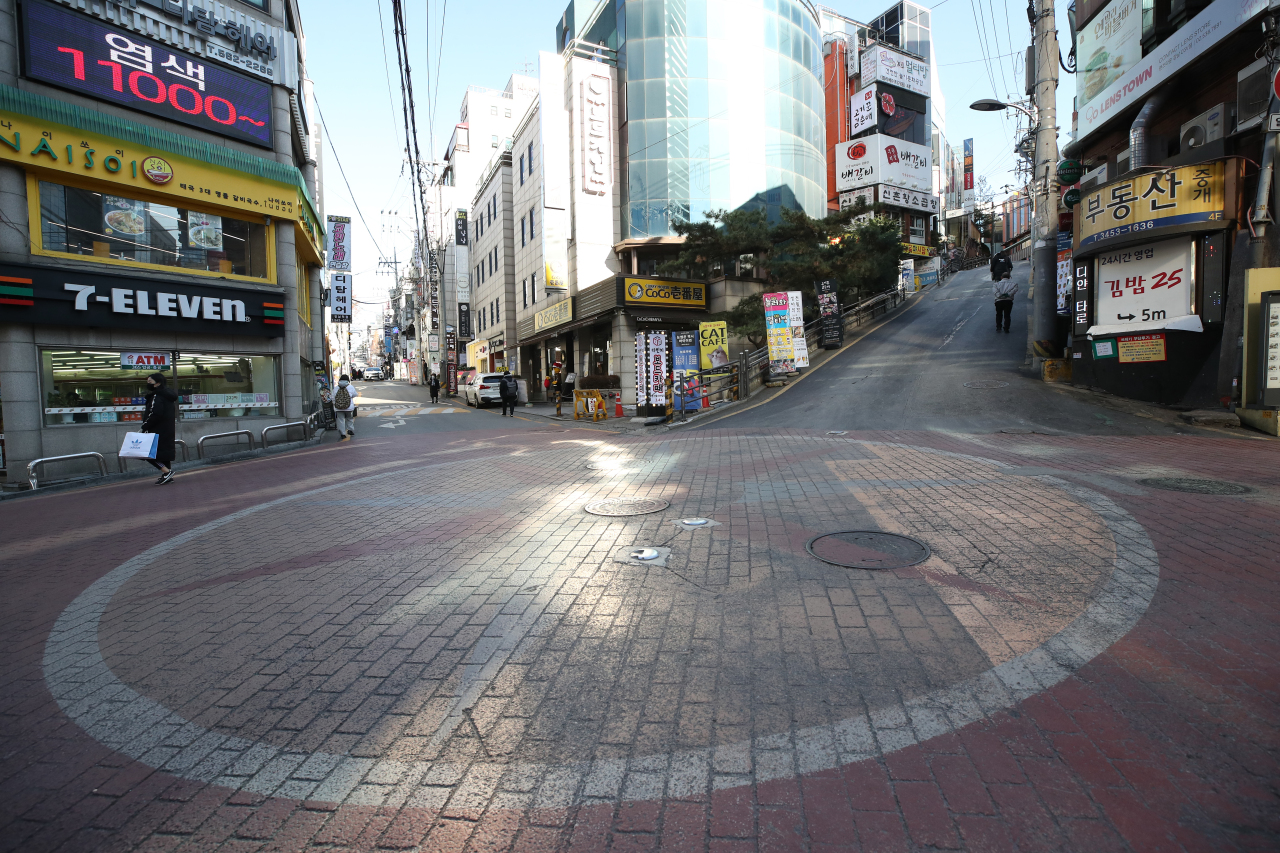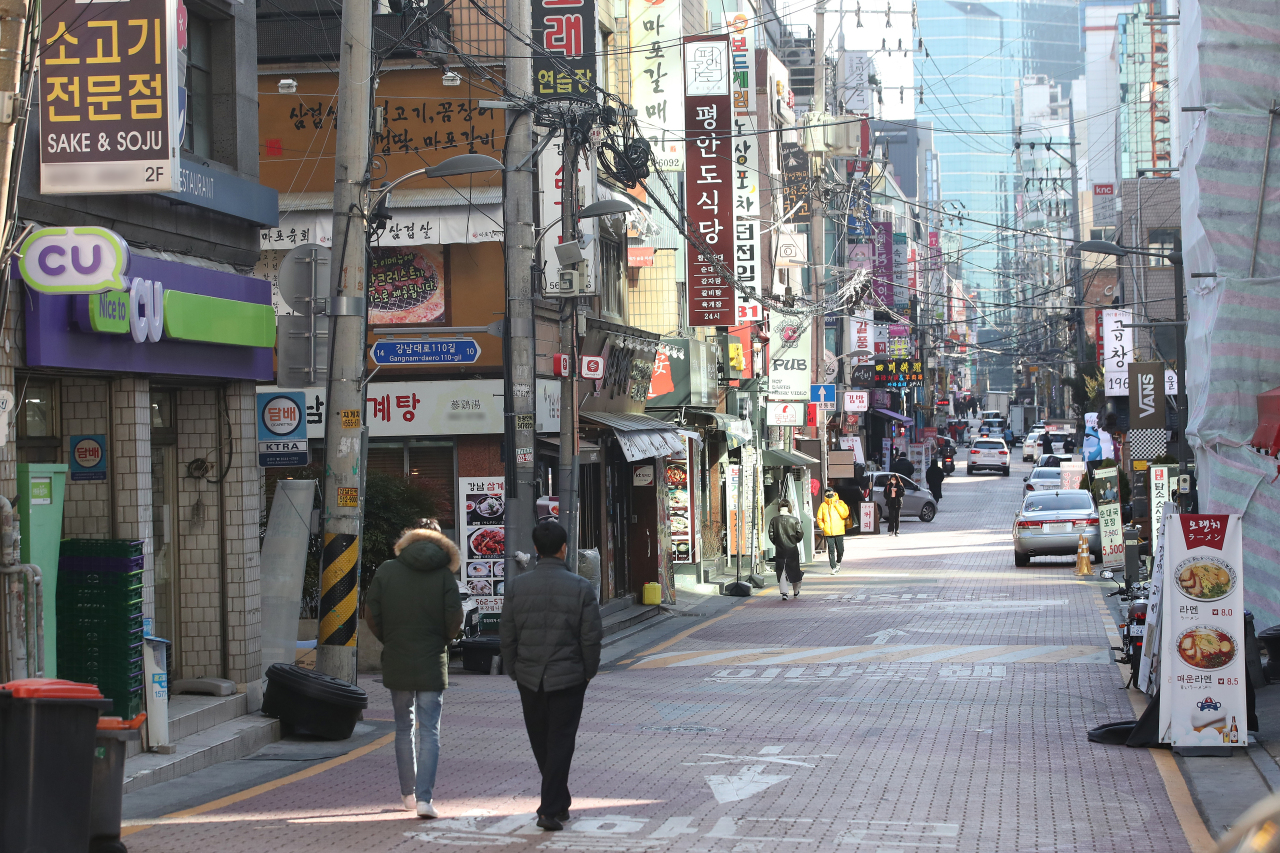
A view of empty streets in the Gangnam district, Seoul, Dec 14, 2020. (Yonhap)
Jung, the owner of a restaurant in southern Seoul’s bustling Gangnam district, increasingly finds himself in what he calls his “worst nightmare,” as he struggles to keep his shop afloat amid the ban on gatherings of five or more people at public facilities like his.
“It just pains me. Day by day, I see more and more empty seats. I’ve always been a guy that sees the glass half full rather than half empty. Not so much these days.”
Jung is one of the nation’s 5.8 million “micro firm” owners with fewer than 10 employees. They make up almost 4 out of 10 local businesses here and have been hit hardest by the COVID-19 pandemic and the government’s heightened social distancing curbs.
Early this week, the government announced a new 9.3 trillion won ($8.2 billion) relief package to protect micro businesses, but the business owners said the amount, worth up to 3 million won per person, fell far short of their expectations.
K-shaped recoveryCountries around the world have rolled out similar relief measures for businesses. Only select sectors have made a recovery but the economy as a whole has a long way ahead to a full rebound in most countries. This conflict has been dubbed the “K-shaped recovery.”
As South Korea continues to fight its third-deadliest wave of the coronavirus pandemic, the government acknowledged the Korean economy was heading toward a K-shaped recovery, vowing to focus more on aiding have-nots such as micro firms and blue-collar workers.
“I call it the K-shaped recovery because for some there’s been a sharp rebound and for others it’s been a continuing decline,” said Peter Atwater, an adjunct economics professor at the College of William & Mary in Virginia, who has popularized the term.

A view of empty streets in the Gangnam district, Seoul, Dec 14, 2020. (Yonhap)
“Those with wealth and the ability to work from home feel powerful, whereas others in the travel and entertainment industries feel powerless over job losses,” he said. “Mounting hopelessness will fuel social unrest as those at the bottom demand change.”
Atwater predicted the K-shaped recovery will persist in 2021 -- even after the global vaccine distribution -- and galvanize society, urging governments to come up with a more strategic approach.
“I believe that unemployment assistance paired with government sponsored re-training opportunities should be considered not just by South Korea, but global governments more broadly,” he said.
Retraining workers and shielding firmsWorkers at micro firms should be able to shift to another business if they find themselves no longer profitable. The government should provide them with expertise and loans needed to make the transition, said Kim Tai-gi, an economics professor at Dankook University.
"This will be one of the fundamental changes we say we need in the wake of the pandemic," Kim said, referring to the fact that Korea has no such standing programs to aid workers crossing into other sectors.
Kim Sung-hee, a professor of labor studies at Korea University, said the government should in the meantime expand the safety net for micro firms themselves.
“They need better protection, so when they fall, they can quickly get back on their feet,” Kim said, that adding a better safety net stimulates the economy because people consume more.
A majority of micro firms here, choosing not to join the state employment insurance, have complained that the insurance does not afford them benefits when they need them most. The government is currently eyeing a system overhaul.
Meanwhile, Sohn Sung-won, a finance and economics professor at Loyola Marymount University in Los Angeles, said the Korean government should revive growth momentum because a new source economic growth, such as the initiative to boost green technology and infrastructure, keeps the economy expanding.
By Choi Si-young (
siyoungchoi@heraldcorp.com)


![[Exclusive] Korean military set to ban iPhones over 'security' concerns](http://res.heraldm.com/phpwas/restmb_idxmake.php?idx=645&simg=/content/image/2024/04/23/20240423050599_0.jpg&u=20240423183955)




![[Pressure points] Leggings in public: Fashion statement or social faux pas?](http://res.heraldm.com/phpwas/restmb_idxmake.php?idx=645&simg=/content/image/2024/04/23/20240423050669_0.jpg&u=)